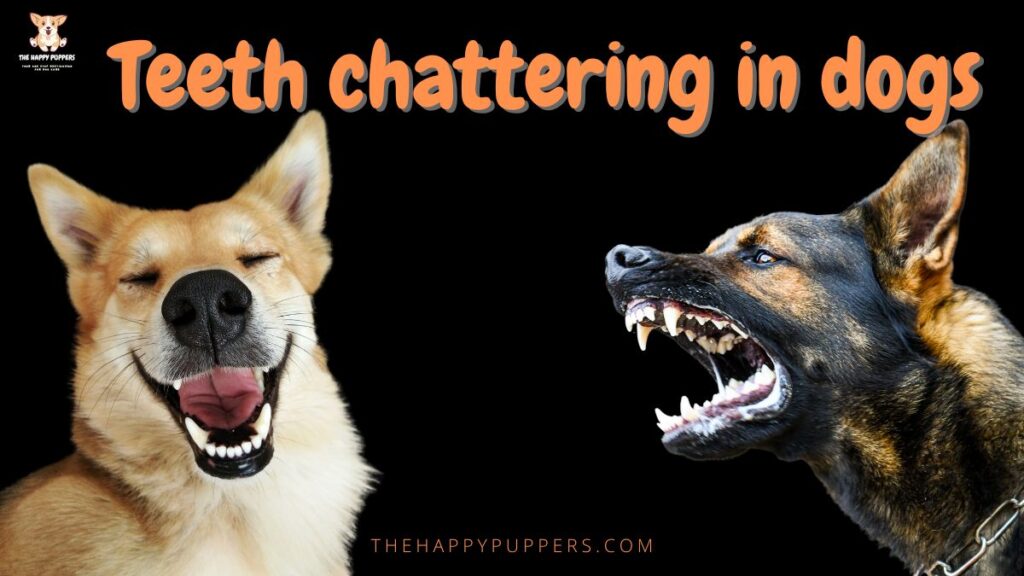What comes to your mind when you think of teeth chattering? You may think of someone who is either very cold or extremely nervous. However, have you noticed your dog exhibiting a similar behavior? Yes! dog teeth chattering is a fairly common behavior noticed by guardians. However, why does this behavior occur? Is it because your dog is cold, extremely nervous, fearful, or anxious? In this blog post, I will discuss what is teeth chattering in dogs; what causes dog teeth chattering, and finally, whether is this something you should be worried about.
Do you wish to stay updated with all the latest tricks and tips from the dog care world? Is it your wish to be the best dog guardian? If your answer is yes, then subscribe to The Happy Puppers. The subscription option is present in the sidebar. If you like to watch videos, subscribe to the YouTube channel of The Happy Puppers, Shruti, and Delta. Remember to ring the notification bell and set it to ALL. This way YouTube will notify you every time a new video releases.
Watch the video:
Topics covered in this blog post
Dog teeth chattering: is it normal?
In case you suddenly notice your dog showing signs of teeth chattering; you may be wondering, what is the cause behind such behavior? Is this a normal behavior or is this something you should be worried about? The answer to such a question depends on a variety of factors. For one, the answer will depend on the dog and the circumstance. Therefore, before you figure out why your dog is exhibiting such behavior, you must understand the different causes behind this behavior itself.
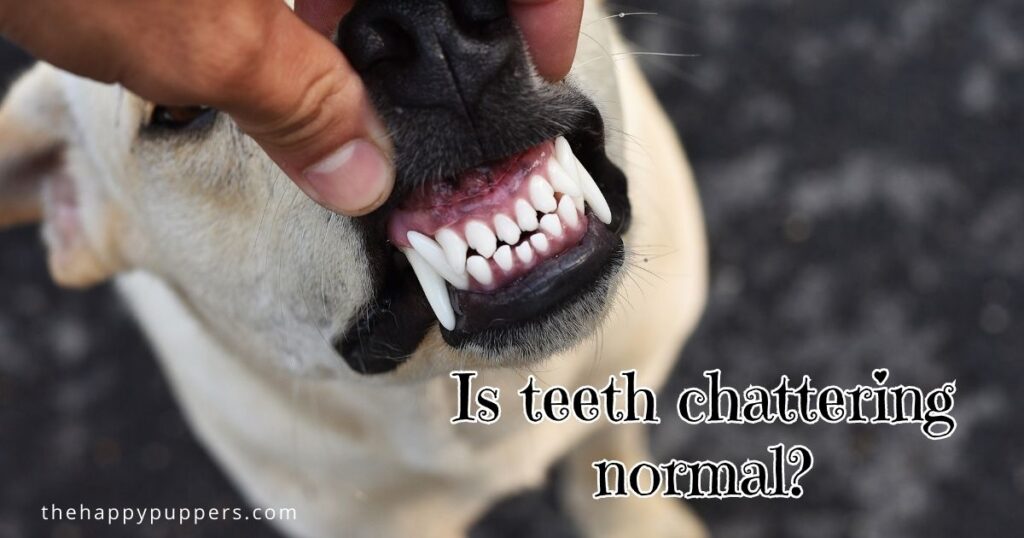
Why should you understand dog teeth chattering?
There are two conditions when you might notice teeth chattering in dogs. It can either be due to internal or external causes. If the dog’s teeth chattering occurs as a result of a stressful situation or any other outside factor, the behavior is considered to be relatively normal. However, if the teeth chattering in dogs suddenly develops with the presence of a known trigger, you should pay very close attention to the behavior, as this may indicate the presence of an underlying health condition.
Causes behind dog teeth chattering
There are a few different causes behind the behavior of dog teeth chattering. If you notice the behavior occurring without an external cause, take your dog to the vet immediately so that the underlying cause can be identified and treated as soon as possible.
Medical causes behind dog teeth chattering.
One of the most well-known causes behind teeth chattering in dogs is dental or oral cavity pain. In case your dog has a dental abscess, broken tooth, or gingival inflammation, he is in a serious level of pain which can manifest as dog teeth chattering.
Another condition of the oral cavity that can lead to teeth chattering in dogs is the presence of oral ulcers or growth (cancer) in your dog’s mouth. These conditions may or may not involve the teeth of your dog. However, it can definitely lead to teeth chattering and pain.
Other symptoms that may occur along with dog teeth chattering are:
- Excessive drooling behavior.
- Bad breath in dogs (indicative of infection).
- Difficulty in picking and chewing food.
- Hesitant in eating hard kibble (dry dog food) and preferring softer and mushier food instead.
Your veterinarian will conduct an oral exam on your dog to check for the presence of soft-tissue inflammation or dental disease. On the basis of the diagnosis, your veterinarian will prescribe the medication.
Swelling in the Temporomandibular joint (TMJ)
Dogs who are suffering from pain in the temporomandibular joint may exhibit signs of jaw chattering. In case your dog is suffering from arthritis or TMJ involving teeth chattering, he may show signs similar to suffering from oral disease.
The veterinarian will check the oral cavity of the dog by opening and closing his mouth. Here, they will check for resistance to movement or grinding. In case they suspect TMJ disease, they will check for it via computed tomography (CT) or X-ray.
Presence of a gastrointestinal issue
Unknown to many dog guardians, gastric issues can also lead to teeth chattering in dogs. If your dog is displaying signs like vomiting, nausea, or gastroesophageal reflux, your dog may show signs of teeth chattering. If your dog has a clenched jaw, the teeth may start to rub together, leading to a grinding sound. This may also cause your dog to drool.
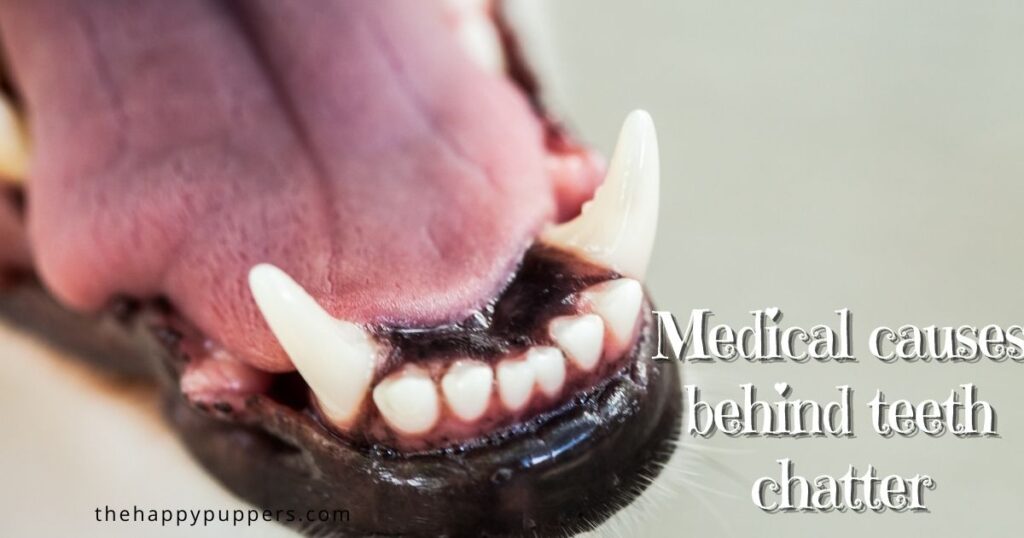
Anxiety
High levels of anxiety can also lead to dog teeth chattering. Breeds like greyhounds who have a tendency to display high anxiety levels can show signs of dog teeth chattering during veterinary exams. Once they are out of the clinic, the chattering usually dies down.
Seizures
Certain specific neurological conditions like focal seizures (seizure pattern that only affects a certain region of the brain) may show up as teeth chattering in dogs. They may also display fly-biting behavior.
Dogs who suffer from epilepsy/seizure disorders will not respond to you if you call them, while he is in the middle of the seizure. During seizure episodes, dogs generally space out. This is why your pup may not respond to you calling his name, clapping hands, or even shouting. There are certain signs that can let you know that a seizure is coming. Some of the signs that your dog may show before a seizure occurs are becoming clingy, pacing all over the place or be overly tired.
Your veterinarian may ask you to keep a very close eye on your pup. If you notice signs, video record them so you can show them to the vet during your visit. You must also make a note of the circumstances around the seizure like the level of activity, behavior, specific time of the day, etc. These details will help your vet find out if the dog teeth chattering is due to epilepsy.
Pheromones
If you have an intact male dog, he may display the behavior of teeth chattering in dogs as a result of excitement after smelling a female dog in heat. However, this behavior is not only restricted to male dogs. Female dogs may display similar behavior. When dogs of one gender experience pheromones of the opposite sex, the odors are captured on the roof of the dog’s mouth. This may also result in excessive foamy salivation.
Presence of inflamed muscle or ear infection
Muscle inflammation and ear infection are two other causes of teeth chattering in dogs. Which is the actual cause behind the teeth chattering behavior will be identified by the vet via either a physical scan or further testing like CT, X-rays, special bloodwork, or both.
Cold temperature
This is one point humans identify with. We also shiver when the temperature drops and we feel cold. If your dog feels cold, he may also experience teeth chattering in dogs. This is done to generate body heat and keep warm. The chances of dog teeth chattering are higher if your dog has a short-haired coat. If this is the case, you should get your dog some good quality woolen sweaters. Try to keep him inside more if your pup is one who prefers to be out.
Behavioral causes behind dog teeth chattering
Feeling threatened
Dogs have been known to use displacement language as a communication method for the purpose to ward off potential predators and threats. Dog teeth chattering is one-way dogs try to subtly communicate with a threatening dog. The clicking sound created by teeth chattering in dogs is used to distract the threatening dog. While the attacker focuses his attention on the source of the sound, the threatened dog has time to become calm. The other forms of displacement communication used by dogs in threatening situations are spinning in circles and licking the face.
Sniffing
Dogs are dependent on their mouth and noses to make sense of their environment. At the bottom of the nasal cavity is an olfactory chamber referred to as the vomeronasal organ. This allows them to taste and smell simultaneously. It is possible that your dog will engage in teeth chattering when he is sniffing because the whole of the vomeronasal system is put to work. Surprisingly, teeth chatter is more often observed in the case of male dogs than females.
Shaker syndrome
A form of multi-system neuronal degeneration called white dog shaker syndrome or just shaker syndrome. This is a neurological condition that leads to teeth chattering in dogs. This disease is very common in small dogs like Bichon Frise, Maltese, and West Highland. A commonly known symptom of Shaker syndrome is full-body tremors leading to teeth chattering.
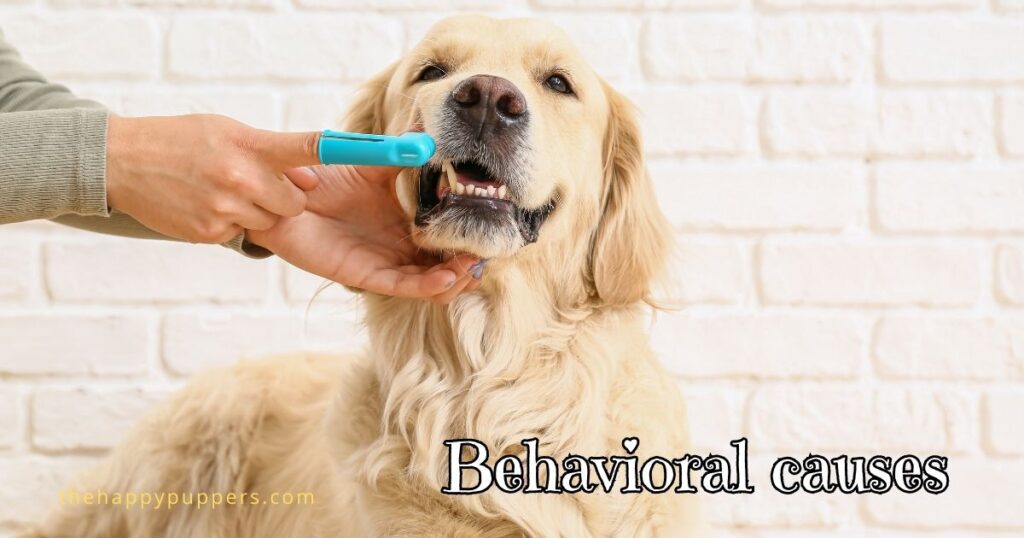
As a result of medication side-effect
In most cases, a direct link has not been found between medicines and dog teeth chattering. However, certain drugs may have certain physiological or neurological side effects. These side effects can manifest as teeth chattering in dogs. The effect of side effects can vary depending on the sensitivity of the pup. Here are some of the ways in which medications can lead to teeth chattering in dogs.
Effects on the nervous system
Some specific nervous system medications, specifically the ones that work on the central nervous system can lead to neurological side effects in dogs. These side effects range from teeth chattering in dogs to involuntary muscle movements.
Muscle Tremors
The medications that affect muscle function can cause muscle tremors. These tumors also include the jaw muscles that lead to dog teeth chattering.
Sensitivity towards stimulants
Dogs can have an unexpected reaction to stimulant medications. In some cases, one of the unexpected responses can be teeth chattering in dogs.
Allergic reaction
Dogs who have allergy issues can exhibit various symptoms in case of allergic responses. Teeth chattering is one such response. If your dog has allergy issues, you must carefully monitor any behavioral changes that your dog may show once started on new medication.
Stress and anxiety
Some medicines used for the treatment of stress and anxiety may lead to side effects like teeth chattering in dogs. Mostly teeth chattering is a result of discomfort or heightened levels of stress.
Discomfort and Pain
Dogs who are on medicines for pain management may have teeth chattering as a part of the side effect of the medicine on the muscles.
Should you be concerned about teeth chattering in dogs?
Now, that you know of dog teeth chattering, what should your response be as the dog guardian? The primary thing to remember here is to monitor your dog’s behavior. Your response to dog teeth chattering will depend on why the teeth chattering is occurring in the first place.
If you know of an obvious reason that is causing the teeth chattering in dogs like social interaction with aggressive dogs, cold weather, excitement etc, you have your answer. If these are the causes behind the teeth chattering, you have nothing to worry about. However, if you are concerned or worried, it is always a good idea to get a check-up done at the vet.
If you notice teeth chattering when you leave the house, your dog is at the vet, its thundering, raining or storming outside, your dog is most likely suffering from a case of anxiety. Ask your vet about your option in such circumstances. You can opt for CBD treats or add CBD oil to your dog’s diet to keep him calm in such situations. However, before starting your dog on anything new, consult your veterinarian
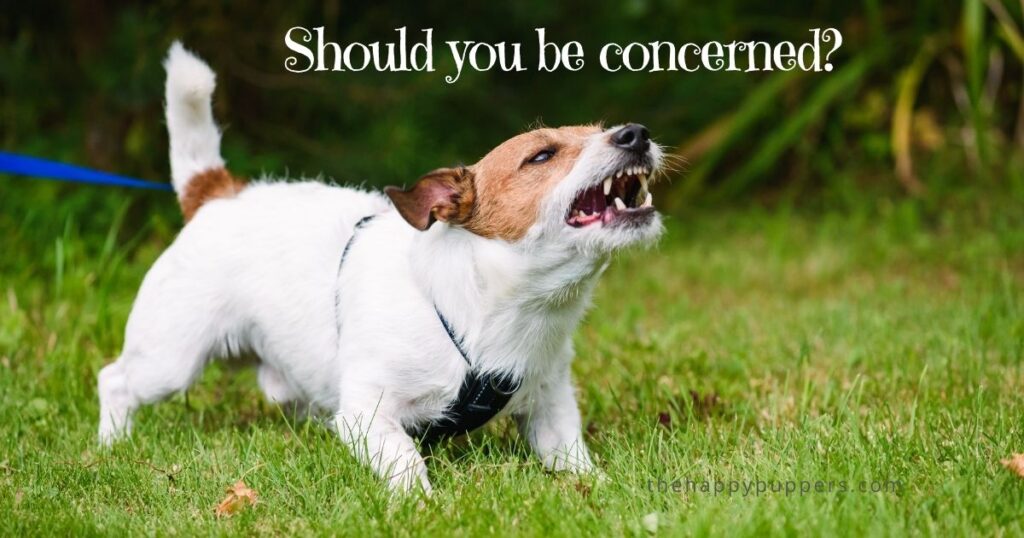
In case you are worried about health issues being the underlying reason of teeth chattering in dogs, take your dog to the vet as soon as possible. Your vet will check for oral health issues. Allowing rotting teeth, tartar, or periodontal disease to fester will extract a heavy price from both you and your dog. Thus, such issues should not be left unaddressed.
In case your dog suffers from a neurological problem like Shaker syndrome or epilepsy, your veterinarian will prescribe anti-seizure medications and suggest some changes in lifestyle like a consistent sleep schedule, monitored playtime, and a stress-free environment at home.
When should you take your dog to the vet?
As I mentioned before, you do not have to take your dog to the vet every time his teeth chatter. However, there are certain conditions where you must take your dog to the vet the moment you notice teeth chattering. Following are the conditions when you should not ignore a vet visit.
Conclusion
There are a variety of reasons behind teeth chattering in dogs. It can indicate excitedness, anxiety, or medical issues. If you suspect medical problems at the root of dog teeth chattering, do not ignore the vet visit. You must get your dog checked so that any underlying health conditions can be ruled out.
If you want to know more about dog care, psychology, training, or how to be the best dog guardian, please subscribe to The Happy Puppers. The subscription option is present in the sidebar. If you like watching videos, subscribe to the YouTube channel of The Happy Puppers, Shruti, and Delta. Do not forget to ring the notification bell and set it to ALL so that YouTube notifies you the moment the next video releases.
See you in my next blog post.
Dr. Shruti
Frequently Asked Questions
Teeth chattering can mean a lot of different things when it comes to dogs. One of the reasons dogs teeth chatter is because they are trying to communicate fear. When the teeth click, the sound can distract the threatening dog and the afraid dog can make his escape, Teeth chattering in dogs can also be used to calm the threatened dog.
Dogs teeth chattering is a signal for nervousness and stress. Dogs also experience social anxiety just like humans. This odd behavior can also be indicative of communicating with an animal they feel threatened by.
Sometimes your dog’s teeth chatter once they have sniffed a dog of the opposite gender. Another case this may happen is when your dog sniffs something they like. most often, such behaviour is also accompanied by lips curling back, licking, and foaming at the mouth.
In case your dog’s teeth are chattering due to gum issues, you should start giving a ton of attention to the oral hygiene of your dog. Ensure that you brush your dog’s teeth daily or at least a few times every week and keep an eye on their gum and teeth color.

